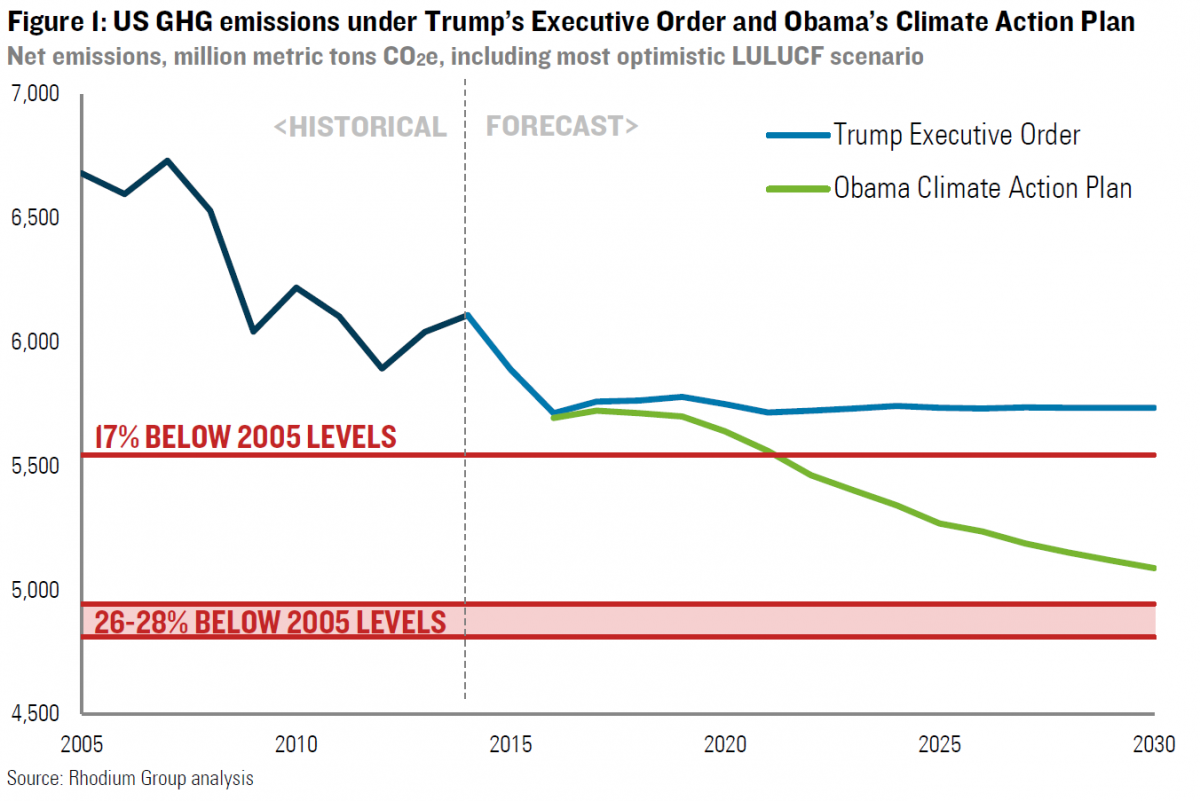
Trump poses with world leaders at the G-7 Summit on May 27, 2017 in Taormina, Sicily. (Left to right) Nigerian Vice President Yemi Osinbajo, Kenya's President Uhuru Kenyatta, Guinea's President Alpha Conde, US President Donald Trump, Italian Prime Minister Paolo Gentiloni, French President Emmanuel Macron, Niger's President Mahamadou Issoufou and Tunisian President Beji Caid Essebsi. (Photo by Jonathan Ernst/AFP/Getty Images)
According to multiple reports, Donald Trump’s advisers are expecting the president to announce that the US will pull out of the Paris Agreement on climate change. The president may still change his mind; he often reverses himself at the last minute, and he’s meeting today with Secretary of State Rex Tillerson, who has been encouraging him to stay in the agreement. But EPA Administrator Scott Pruitt has already been put to work piecing together a plan to withdraw, making a change of course now seem less likely.
If the president goes through with his plan, the US will join Syria and Nicaragua as the only two countries not participating in the agreement. And it will become the only country without an excuse: Nicaragua refused to sign the deal because it didn’t go far enough, and Syria is busy with a civil war.
The decision to pull out is, apparently, partially based on a misconception that the Paris Agreement will prevent Trump from moving forward with his fossil fuel-friendly agenda, including a plan to unravel President Obama’s Clean Power Plan, which was aimed at moving the US away from reliance on coal power plants. Legal scholars have made clear, however, that this theory is incorrect — though the US promised to cut its emissions by at least 26 percent when it signed on to the Paris Agreement, there are no legal ramifications for a country that fails to live up to its promise.
There almost certainly will be diplomatic ramifications, however. And though the world might have disapproved of the Trump administration’s failure to meet the Obama administration’s climate commitments, Trump will face far greater disapproval for bailing on the Paris Agreement entirely.
This will now be the second time the US has pulled out of a global climate agreement. The last time it happened — when the US quit the Kyoto Protocol more than a decade and a half ago — the Bush administration saw its relationship with its allies become chillier. “When the blowback came I think it was a sobering experience that everything the American president does has international repercussions,” Secretary of State Colin Powell later observed. Climate change — and the UN-orchestrated effort to deal with it — have only become more urgent since then.
What it means for the US
Donald Trump has made clear that his agencies will not only ignore climate change, they’ll undermine previous presidents’ efforts to combat it. That means then that the US’ greenhouse gas emissions, which were falling, will level off.
Whether or not the US stays in the Paris Agreement does not change this. A future president can reverse Trump’s domestic policies, and can recommit the US to the Paris Agreement. If Trump’s successor wanted the US to be back in the deal, “there wouldn’t be legal impediments” Susan Biniaz, a legal adviser to the State Department for more than three decades, told me. “A future president could presumably re-join the same way.”
However, Axios reports that Trump may also try to pull the US out of the United Nations Framework Convention on Climate Change, a legal structure approved by President George H.W. Bush that undergirds the Paris Agreement. Because the UNFCCC was a treaty, unlike the Paris Agreement, it was also ratified by the Senate. Withdrawing from the UNFCCC would allow the US to get out of the Paris Agreement more quickly, but would shut it off from the rest of the world on climate issues.
“If Trump withdraws the US from the [UNFCCC], more than anything he is turning his back on the process of international diplomacy in addition to the substance,” writes Ann Carlson, co-Faculty Director of the Emmett Institute on Climate Change and the Environment at UCLA School of Law. “He is essentially saying, ‘we are so hostile to the idea that climate change is occurring that we refuse even to discuss it with the global community.'”
That possibility is currently unfathomable to US allies. “In Europe actually nobody is raising that issue because it would sound completely incomprehensible,” said Wendel Trio, director of Climate Action Network Europe, a coalition that lobbies the European Union and European governments for climate action. “Leaving the Paris Agreement is a bridge too far,” he said, but pulling out of the UNFCCC “would be almost a declaration of war.”
“For European countries, if the US were to leave the UNFCCC, it would close the door completely for any kind of conversation of climate change,” he said.
If Trump does try to pull the US out of the UNFCCC, however, he may find himself in a legal mess. “If it takes Senate ratification by a two-thirds vote to enter the US into a treaty, must the Senate vote by a two-thirds vote to withdraw from one?” writes Carlson. “The answer is by no means clear but would at least give a future president a good argument that the treaty remains in effect as long as the senate has not acted.”
What it means for the rest of the world
Even without the US, other major polluters around the world look ready to continue their efforts to ward off the climate crisis. The US ceding the field is, in particular, a boon to China, which can now position itself as the world’s leader on fighting climate change, a mantle Chinese President Xi Jinping first attempted to claim at the Davos World Economic Forum last winter.
Europe and China are meeting later this week for the annual EU-China summit. Climate change is the headline issue, and the summit was even moved up one month so the two countries could discuss trade and climate action — both issues they see as threatened under Trump.
China, the world’s top polluter, and India, the world’s third-largest polluter are also both on track to meet their promises under the Paris Agreement ahead of schedule, thanks in part to falling coal use. In fact, according to one analysis by the Climate Action Tracker coalition, China and India are so far ahead of schedule on meeting their commitments that it more than makes up for the US bailing on its own commitments.
But this overperformance isn’t enough to contain global warming to 2 degrees Celsius, the UN’s uppermost goal. In fact, without the US’ help, that goal remains out of reach. Low-lying nations are already struggling with sea level rise as the Arctic melts, and have been lobbying the US to remain in the agreement. “No one, no matter who they are or where they live, will ultimately escape the impact of climate change,” Fiji’s Prime Minister Frank Bainimarama told delegates at a May meeting to work on the Paris Agreement that was overshadowed by Trump’s pending decision.





